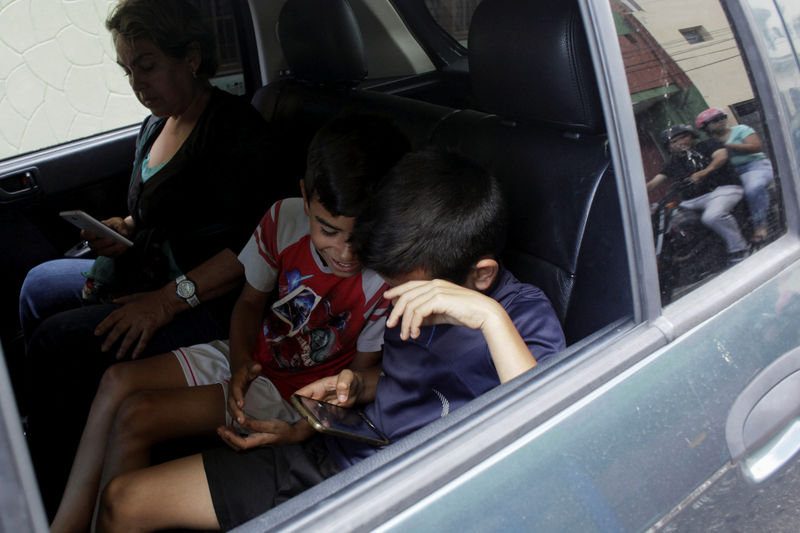By Tibisay Romero and Deisy Buitrago
VALENCIA/CARACAS (Reuters) - With chronic shortages of basic goods afflicting her native Venezuela, Veronica Perez used to drive from supermarket to supermarket in her gray Chevrolet Aveo searching for food.
But the 54-year-old engineer has abandoned the practice because of shortages of something that should be abundant in a country with the world's largest oil reserves: gasoline.
"I only do what is absolutely necessary, nothing else," said Perez, who lives in the industrial city of Valencia. She said she had stopped going to Venezuela's Caribbean coast, just 20 miles (32 km) away.
Snaking, hours-long lines and gas station closures have long afflicted Venezuela's border regions. Fuel smuggling to neighboring countries is common, the result of generous subsidies from state-run oil company PDVSA that allow Venezuelans to fill their tank 20,000 times for the price of one kilo (2.2 pounds) of cheese.
But in late October and early November, cities in the populous central region of the country like Valencia and the capital Caracas were hit by a rare wave of shortages, due to plunging crude production and a dramatic drop in refineries' fuel output as the socialist-run economy suffers its fifth year of recession.
Venezuela produced more than 2 million barrels per day (bpd) of crude last year but by September output had fallen to just 1.4 million bpd. So far in 2018, Venezuela produced an average of 1.53 million bpd, the lowest in nearly seven decades, according to figures reported to OPEC.
Bottlenecks for transporting fuel from refineries, distribution centers and ports to gas stations have also worsened, exacerbating the shortages.
PDVSA did not respond to a request for comment. Neither did Venezuela's oil and communications ministries.
Relatively normal supply has since been restored in Caracas and Valencia after unusually long outages but the episode has forced Venezuelans to alter their daily habits.
That could hit an economy seen shrinking by double digits in 2018. For Venezuelans coping with a lack of food and medicine, blackouts and hyperinflation, the gasoline shortages could also increase frustration with already-unpopular President Nicolas Maduro.
"My new headache is fearing I might run out of gasoline," said Elena Bustamante, a 34-year-old English teacher in Valencia. "It has changed my life enormously."
PRODUCTION SHORTFALL
Venezuela's economy has shrunk by more than half since Maduro took office in 2013. The contraction has been driven by a collapse in the price of crude and falling oil sales, which account for more than 90 percent of Venezuelan exports.
Three million Venezuelans have emigrated - or around one-tenth of the population - mostly in the past three years, according to the United Nations.
Despite a sharp drop in domestic demand due to the recession, Venezuela's collapsing oil industry is struggling to produce enough gasoline.
Fuel demand was expected to fall to 325,000 bpd in October, half the volume of a decade ago, but PDVSA expected to be able to supply only 270,000 bpd, according to a company planning document seen by Reuters.
A gasoline price hike - promised by Maduro in August under a reform package - could further reduce demand but it has yet to take effect.
Venezuela's declining oil production has its roots in years of underinvestment. U.S. sanctions have complicated financing.
The refining sector, designed to produce 1.3 million bpd of fuel, is severely hobbled. It is operating at just one-third of capacity, according to experts and union sources.
Its largest refinery, Amuay, is delivering just 70,000 bpd of gasoline despite having the capacity to produce 645,000 bpd of fuel, according to union leader Ivan Freites and another person close to PDVSA who spoke on the condition of anonymity.
PDVSA has tried to make up for this by boosting fuel imports, buying about half of the gasoline the country needs, according to internal company figures.
In the first eight months of 2018, Venezuela imported an average of 125,000 bpd from the United States, up 76 percent from the same period a year earlier, data from the U.S. Energy Information Administration show.
But delays in unloading fuel cargoes have contributed to shortages, since Venezuelan oil ports are more oriented toward exports than imports, according to traders, shippers, PDVSA sources and Refinitiv Eikon data.
One tanker bringing imported gasoline mixed with ethanol was contaminated with high levels of water, forcing PDVSA to withdraw the product from distribution centers, a company source said, directly contributing to the shortages in Caracas.
The incident was the result of PDVSA seeking fuel from "unreliable suppliers," in part because the U.S. sanctions have left many companies unwilling to do business with Venezuela, said the source, who spoke on the condition of anonymity.
The shortages last week prevented Andres Merida, a 29-year-old freelance publicist in Valencia, from attending client meetings.

"I had someone who used to take me from place to place but in light of the gasoline issue he would not give me a lift even when I offered to pay him," he said. "He said he would prefer to save the gasoline and guarantee it for himself."